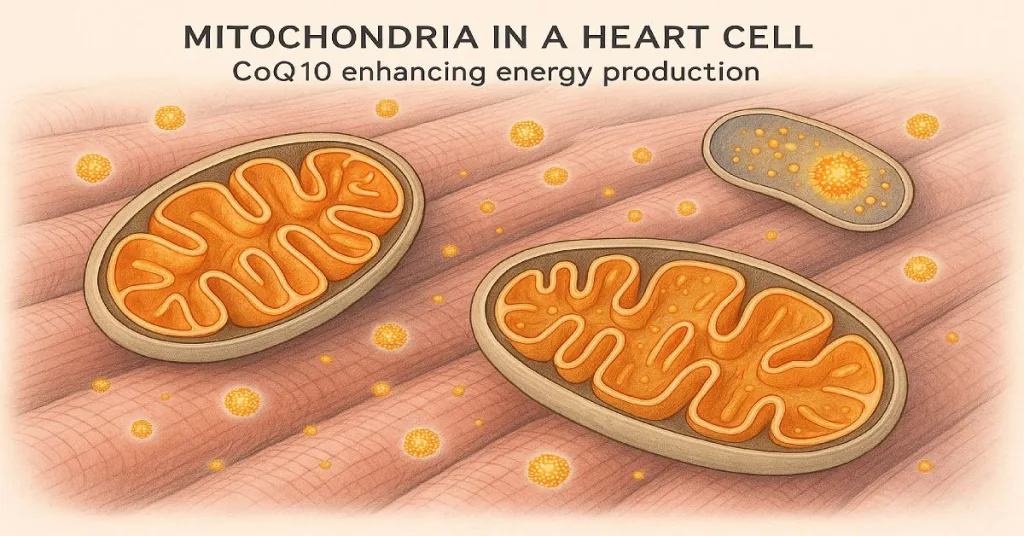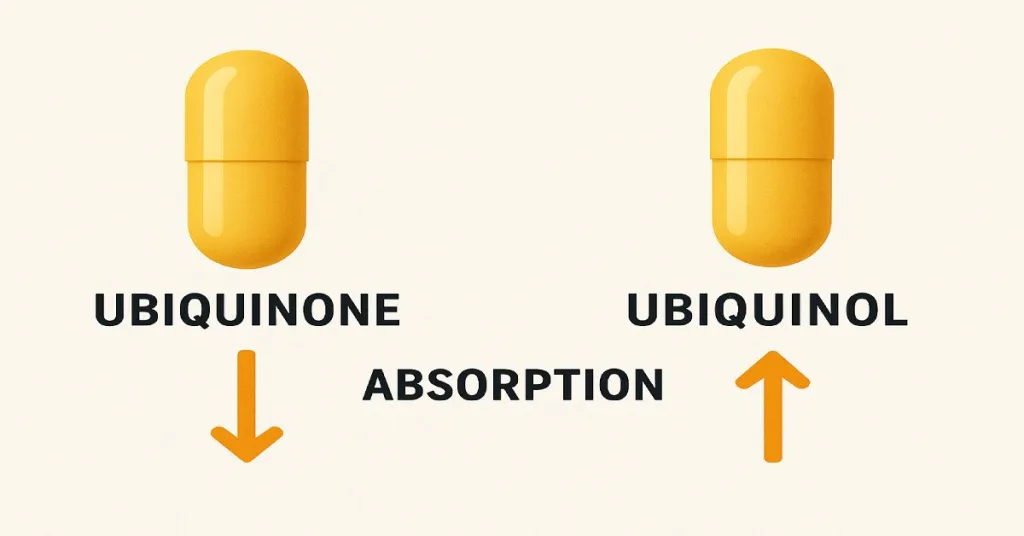CoQ10 heart function support is no longer just a theory — it’s now backed by hard science. A major 2025 study proves that this powerful antioxidant can significantly improve heart performance in people with congestive heart failure (CHF)…
If you’ve ever wondered whether CoQ10 is actually worth taking — or what form gives the best results — this is the update you’ve been waiting for.
This post may contain affiliate links. If you click and purchase, I may earn a small commission at no extra cost to you. I only recommend products I personally use or have thoroughly researched.
🧪 What the New Study Found
In July 2025, researchers from the University of Copenhagen published a randomized, double-blind, placebo-controlled study in the European Heart Journal. The study followed 182 patients with congestive heart failure (CHF) over the course of six months. Participants were given either:
- 300 mg/day of CoQ10 (split into three 100 mg doses)
- OR a placebo
📊 Key Findings:
- Left ventricular ejection fraction (LVEF) improved by an average of 6.3% in the CoQ10 group
- Fatigue scores dropped by 18% on average
- BNP levels (a marker of heart stress) decreased significantly
- No serious side effects were reported
Lead researcher Dr. Henrik Lunde: “CoQ10 appears to offer a real, measurable benefit in cardiac efficiency and energy availability. This could change how we approach CHF management.”
⚙️ Why CoQ10 Helps Your Heart
Your heart never stops working — which means it demands a ton of energy. That energy comes from mitochondria, the “power plants” inside your cells. CoQ10 is a critical cofactor that helps mitochondria generate ATP (energy), especially in high-demand organs like the heart.
But here’s the kicker:
- CoQ10 levels decline with age
- They also decline with certain medications, like statins and beta-blockers
- Low CoQ10 = less efficient energy production + more oxidative stress
That’s a dangerous combo for anyone with heart issues.

🧬 Ubiquinone vs. Ubiquinol: What Form Was Used?
The study used ubiquinol, the reduced, active form of CoQ10. It’s more bioavailable, especially in older adults or those with absorption issues.
🔍 Quick Breakdown:
| Form | Bioavailability | Best For |
|---|---|---|
| Ubiquinone | Lower | General maintenance, budget |
| Ubiquinol | Higher | Heart health, seniors |
If heart health is your primary concern, ubiquinol is worth the extra cost.

🔄 How This Study Compares to Earlier Research
This isn’t the first time CoQ10 has shown promise. In fact:
- A 2014 study from the Kisel-10 trial in Sweden found 43% reduced cardiovascular mortality in seniors who took CoQ10 and selenium together for five years.
- The 2013 Q-SYMBIO trial (a major study) showed CoQ10 reduced hospitalizations and heart-related deaths in heart failure patients.
But the new 2025 Copenhagen study is the most recent and rigorous, using higher doses and better patient stratification. It confirms — again — that CoQ10 isn’t just hype. It’s real, measurable support for your heart.
💊 How Much CoQ10 Should You Take?
For general health, most CoQ10 supplements offer 100–200 mg per day.
But for heart support, especially if you have CHF or take statins, studies suggest:
- 200–300 mg per day, preferably in divided doses
- Take with food (especially fat) to improve absorption
Pro tip: Softgels and oil-based formulas absorb better than dry capsules.
⚠️ Watch Out for These Mistakes
When buying CoQ10, don’t just grab the first bottle you see. Here’s what to avoid:
- ❌ Proprietary blends that don’t list exact CoQ10 content
- ❌ Low-dose formulas (less than 100 mg per serving)
- ❌ Unknown brands with poor quality control or fake reviews
- ❌ Dry tablets or capsules with no oil or delivery tech
🏆 Trusted CoQ10 Brands (Research-Backed)
Here are 4 reputable, research-supported brands that consistently show up in clinical studies or 3rd-party tests:
- Qunol Ultra CoQ10 – Ubiquinone, but formulated to be both water- and fat-soluble, making it more bioavailable than standard ubiquinone
- Kaneka Ubiquinol – Used in many top-tier supplements (check the label for Kaneka logo)
- Life Extension Super Ubiquinol – Trusted brand, enhanced delivery system
- Doctor’s Best High Absorption CoQ10 – Budget-friendly ubiquinol
❤️ Should You Take CoQ10 for Heart Health?
If you’re:
- Over 40
- Taking statins or beta-blockers
- Diagnosed with CHF
- Dealing with fatigue or poor exercise tolerance
…then yes, you may benefit from CoQ10. This new study adds one more reason to make it part of your daily stack.
Even if you’re not diagnosed with heart failure, CoQ10 is one of the safest, most well-studied supplements on the market — especially when heart health is a top priority.
📌 The Bottom Line
This new study from the University of Copenhagen reinforces what supplement experts and functional medicine doctors have said for years:
“CoQ10 isn’t just useful — it’s essential for heart health.”
If you’re serious about protecting your heart, boosting energy, and aging with strength, CoQ10 (especially ubiquinol) deserves a permanent spot in your supplement stack.
see also: The COSMOS Trial: Cocoa, Multivitamins, and the Real Science Behind a Longer, Sharper Life